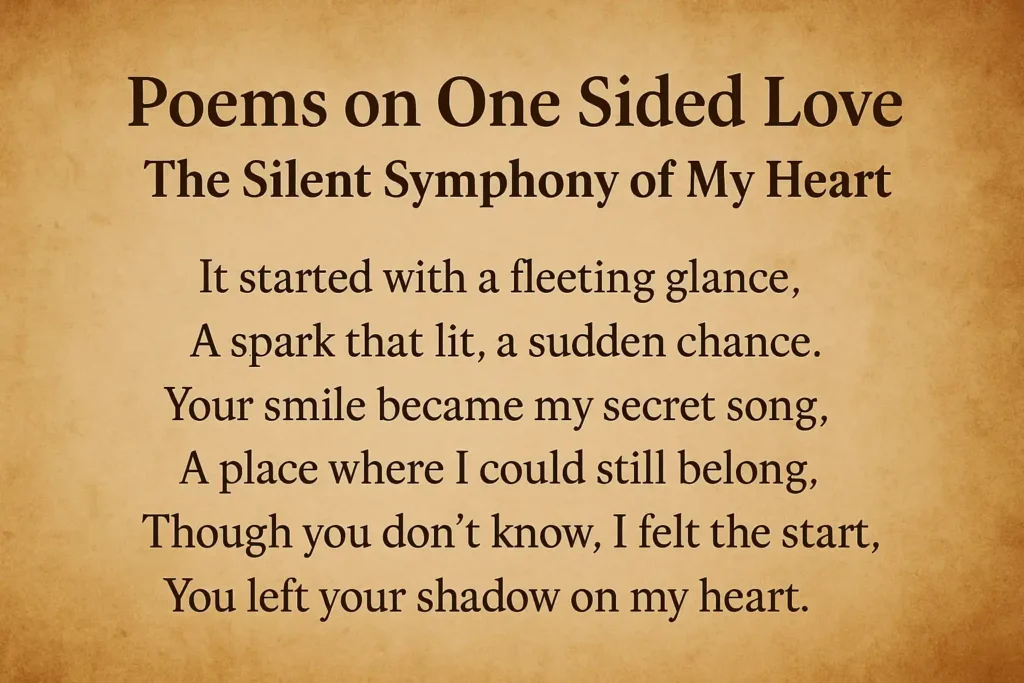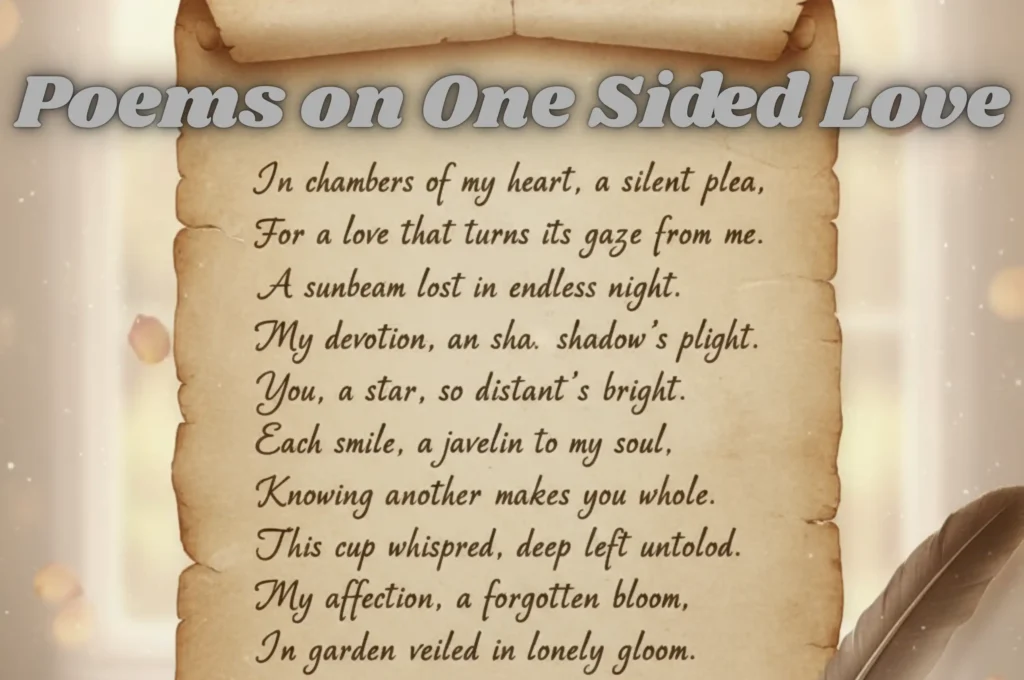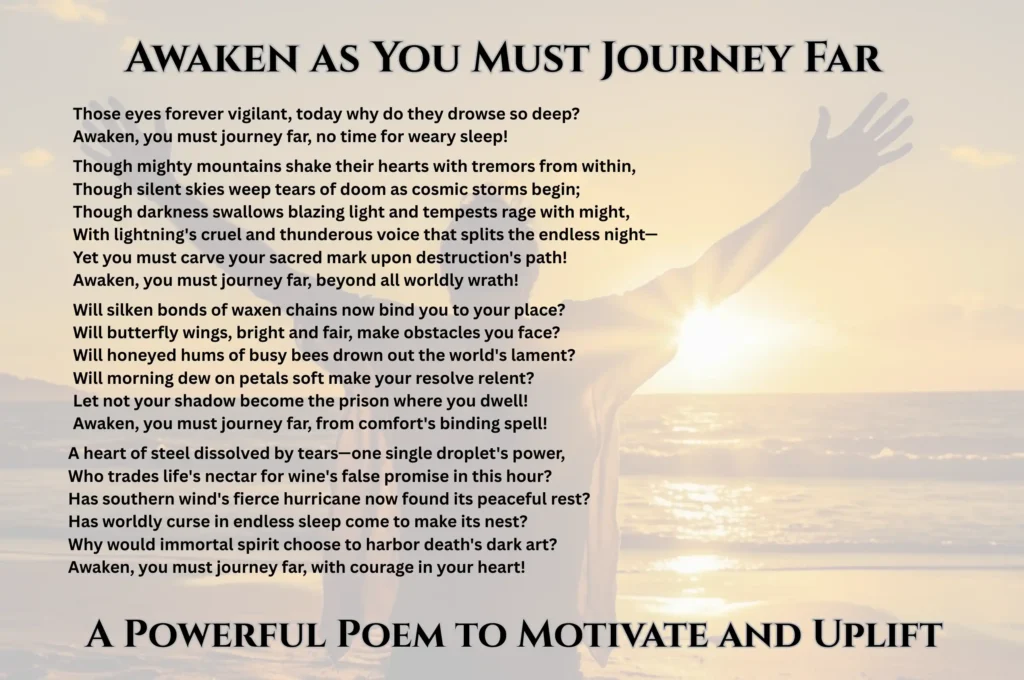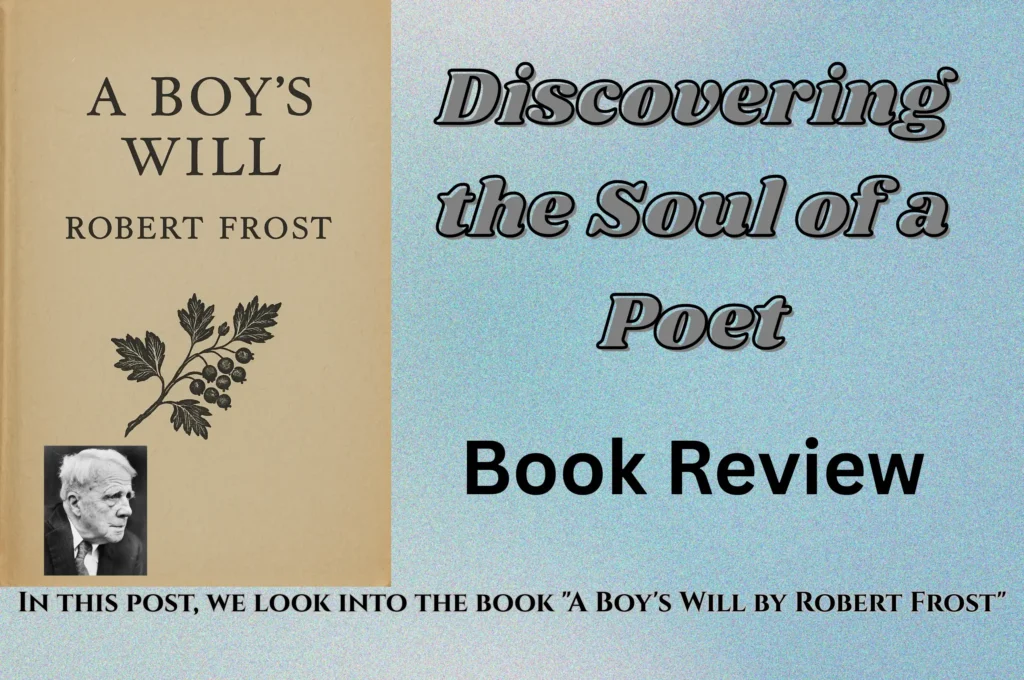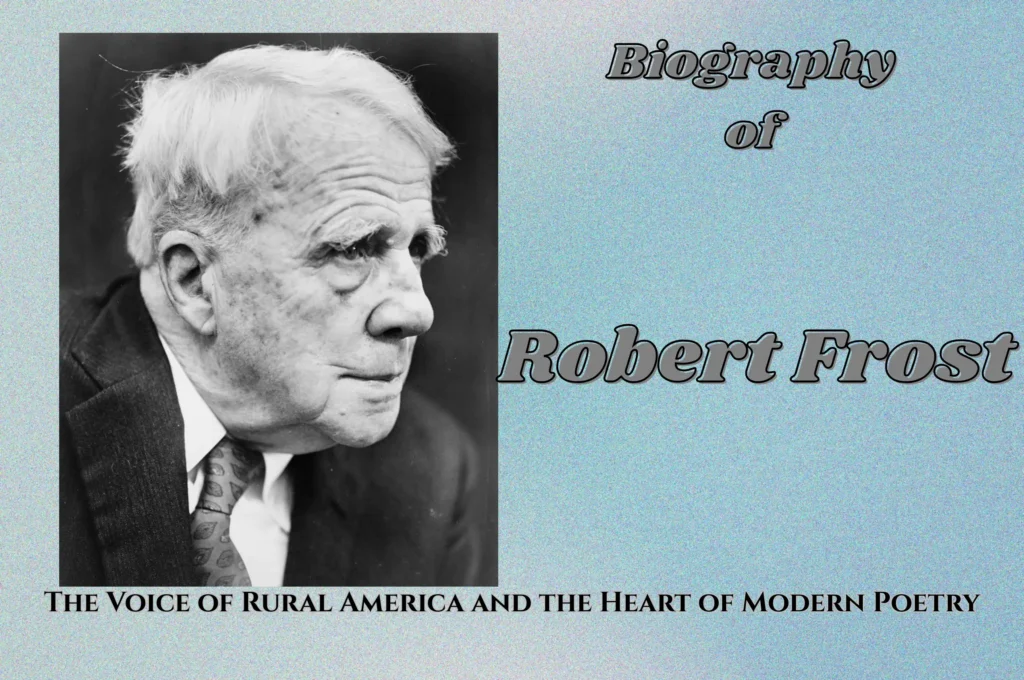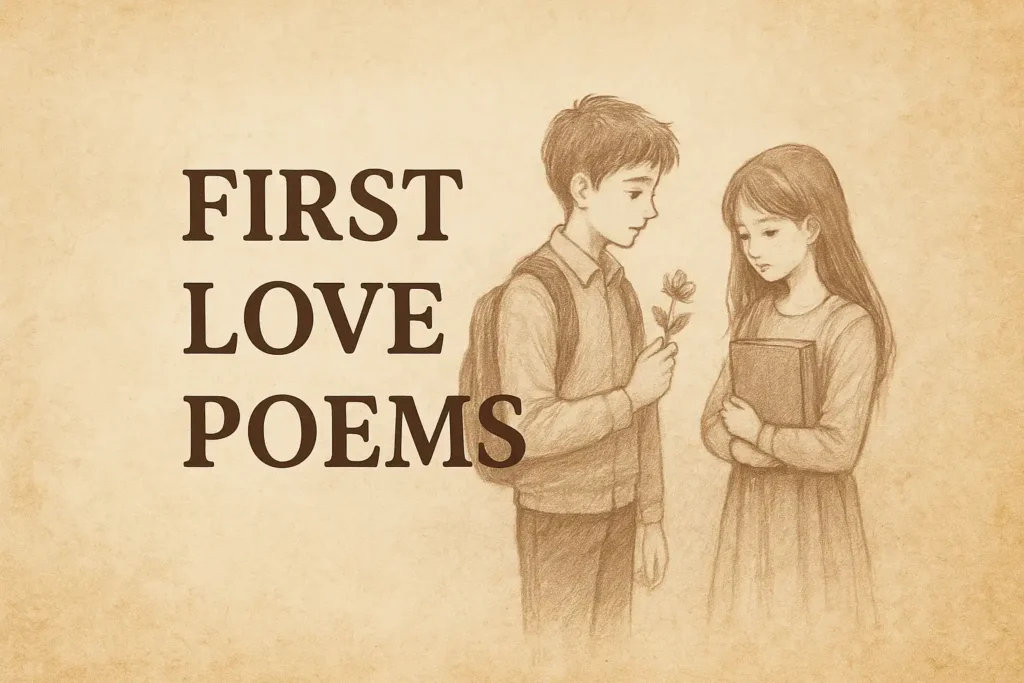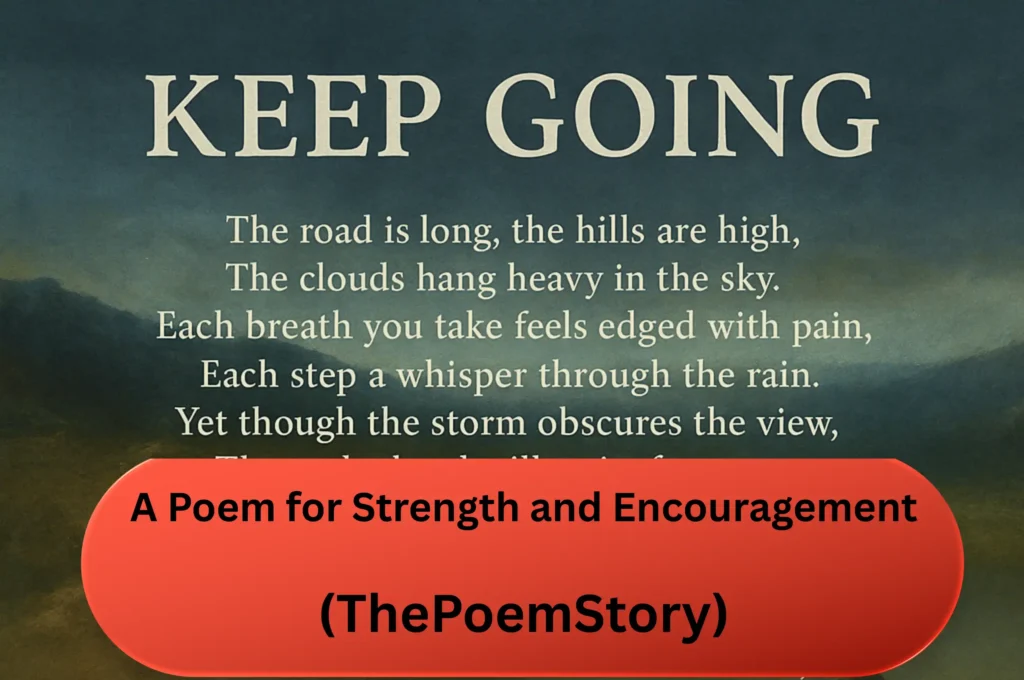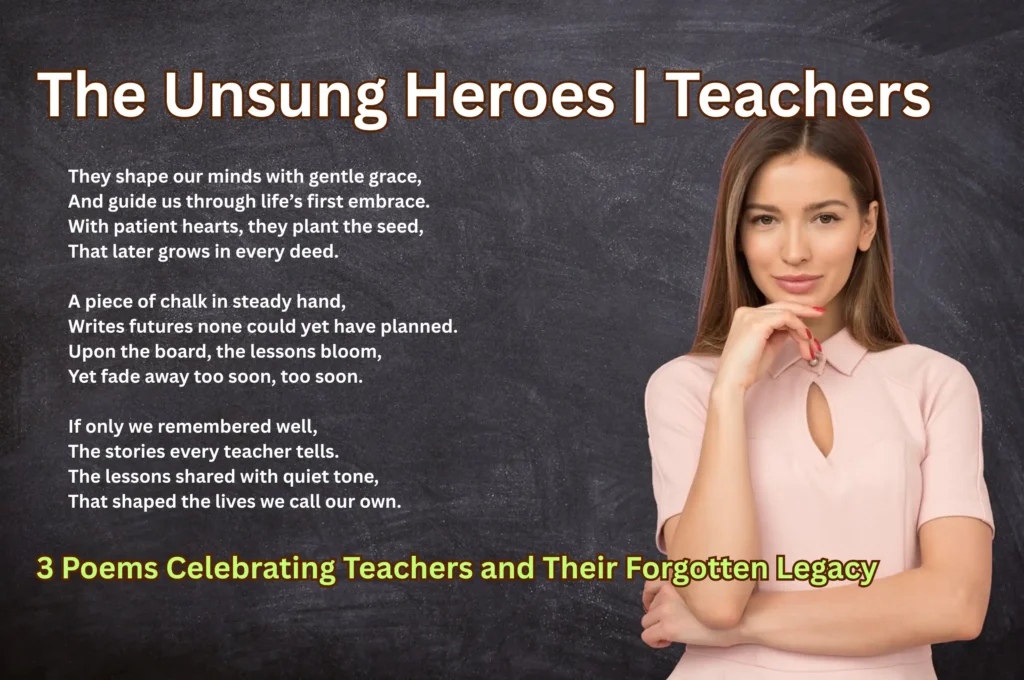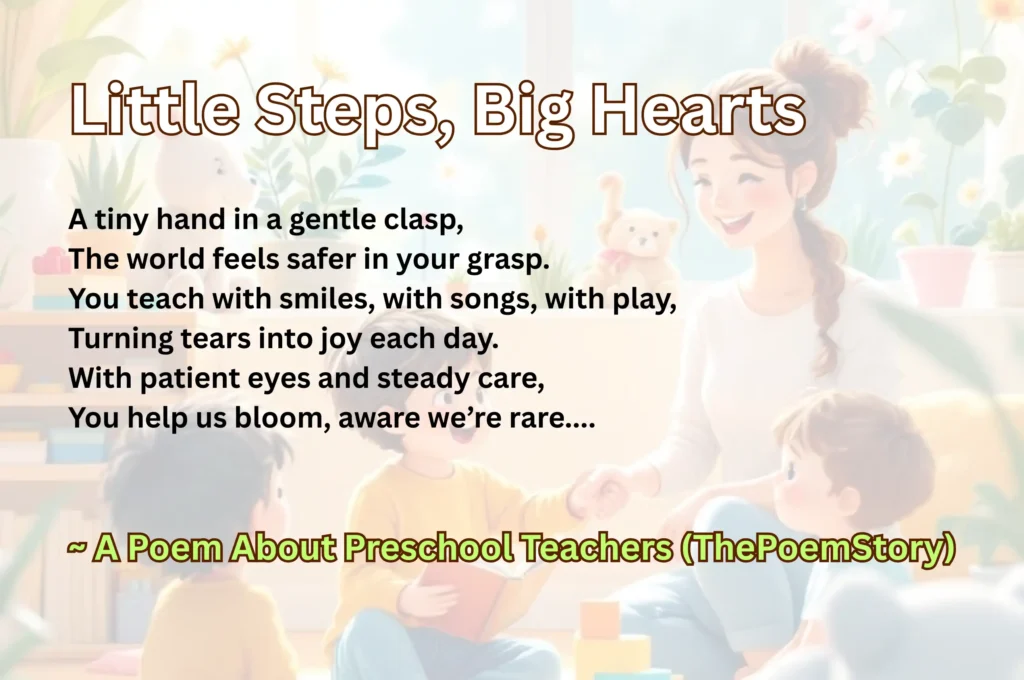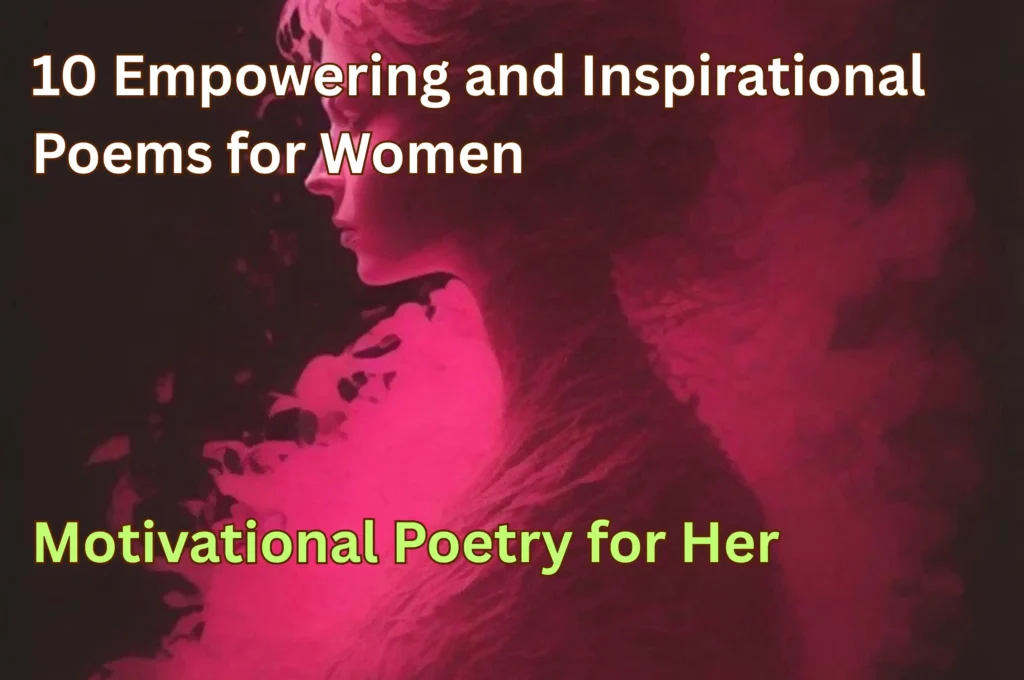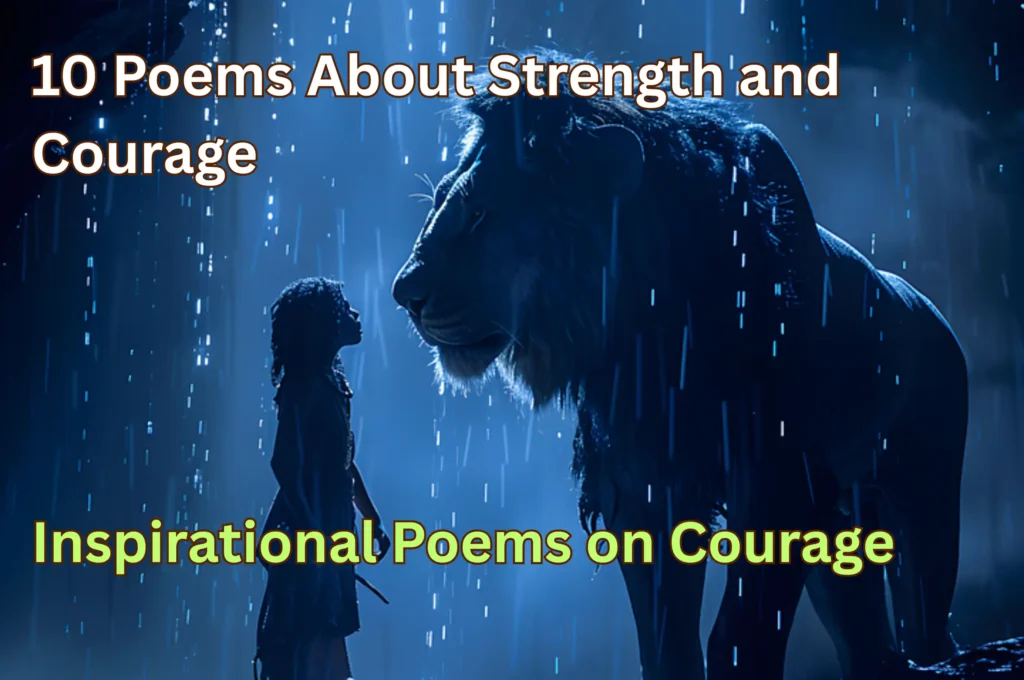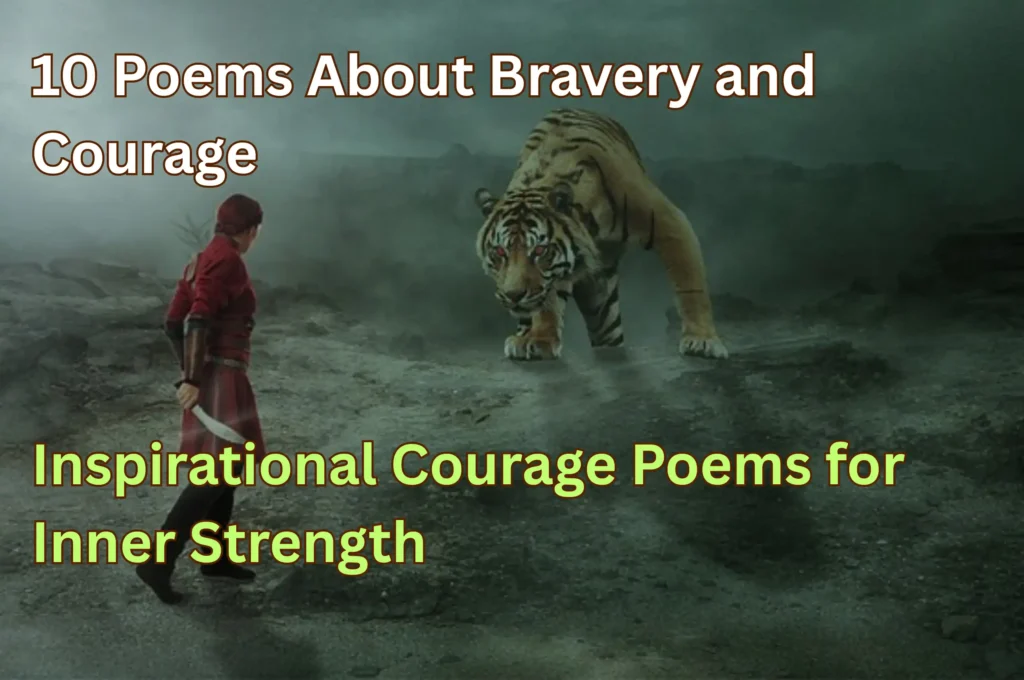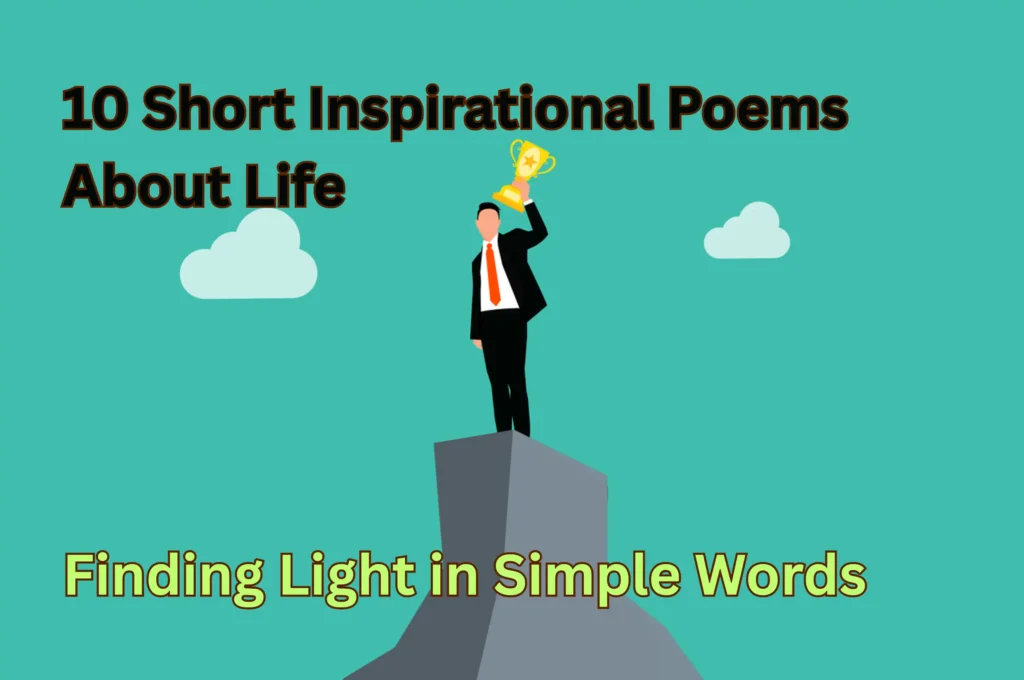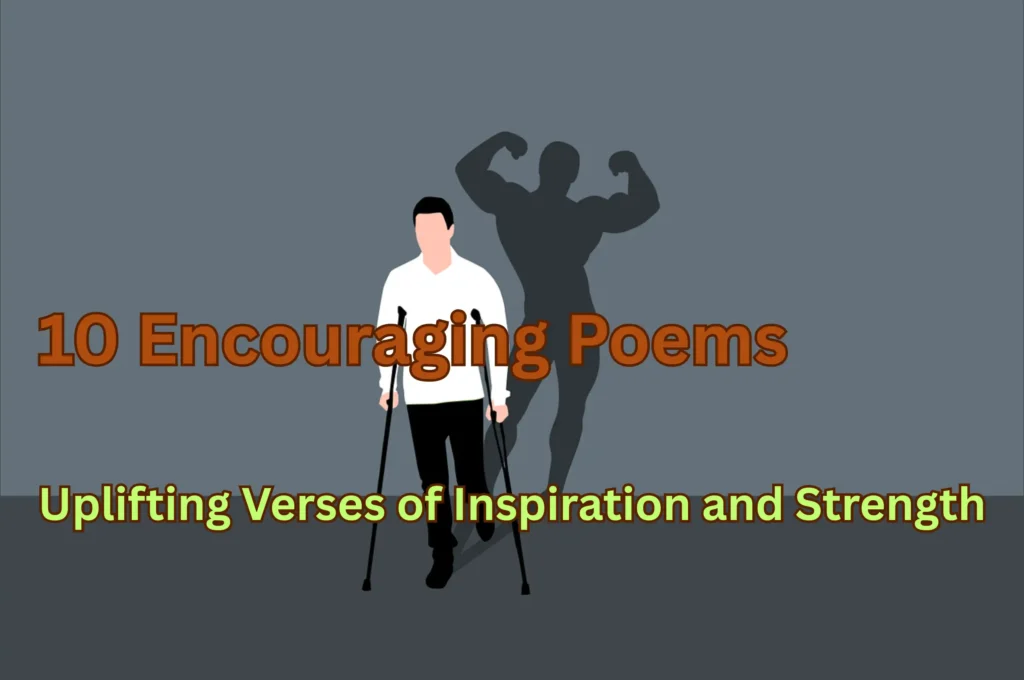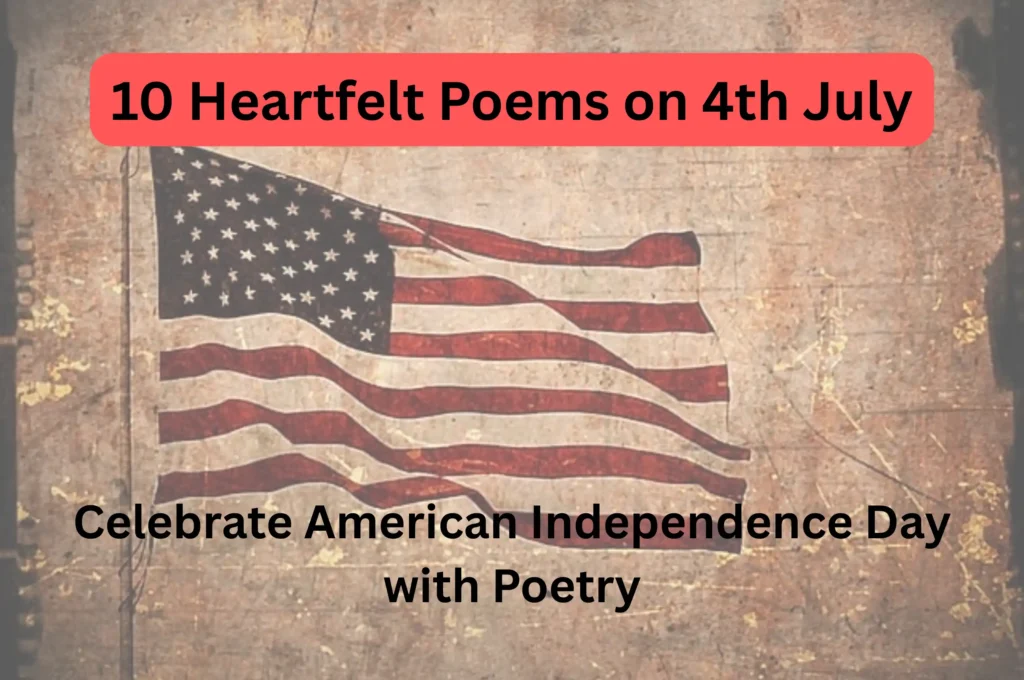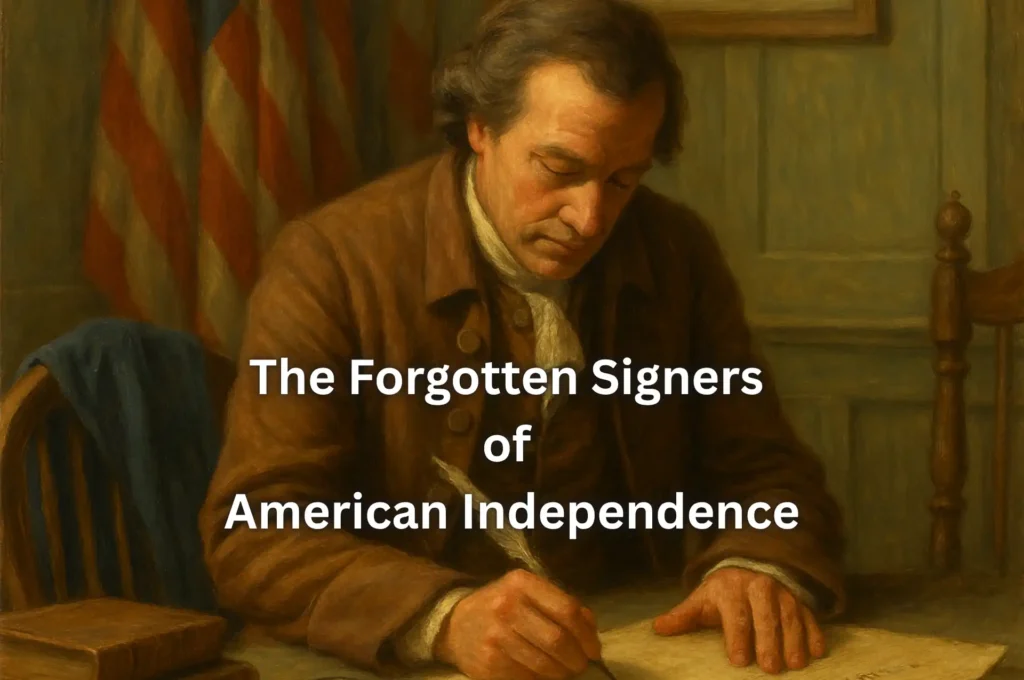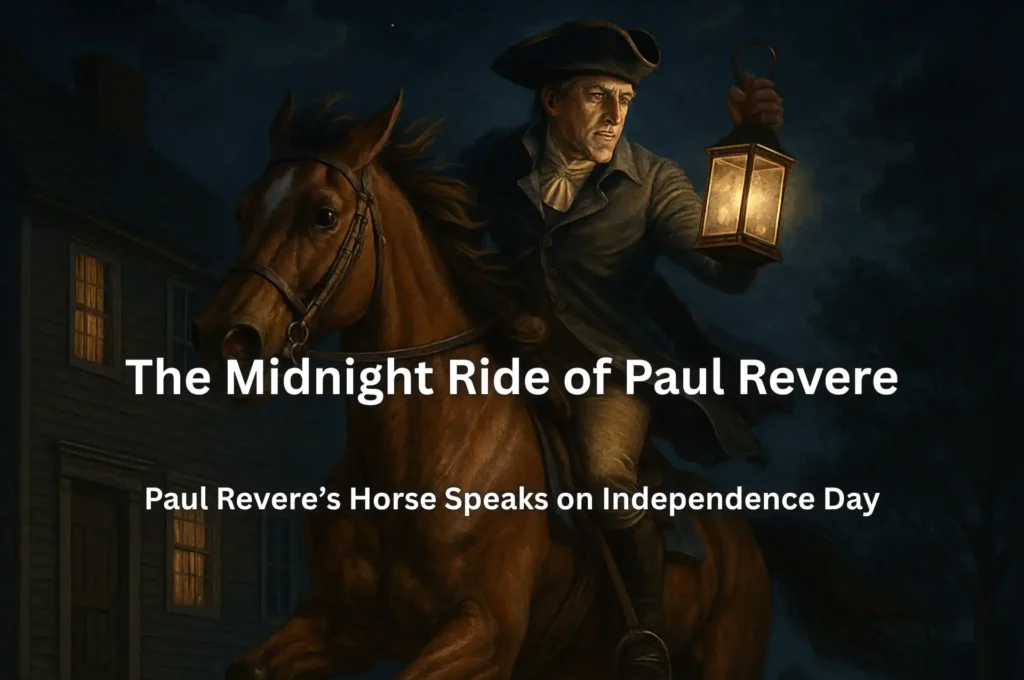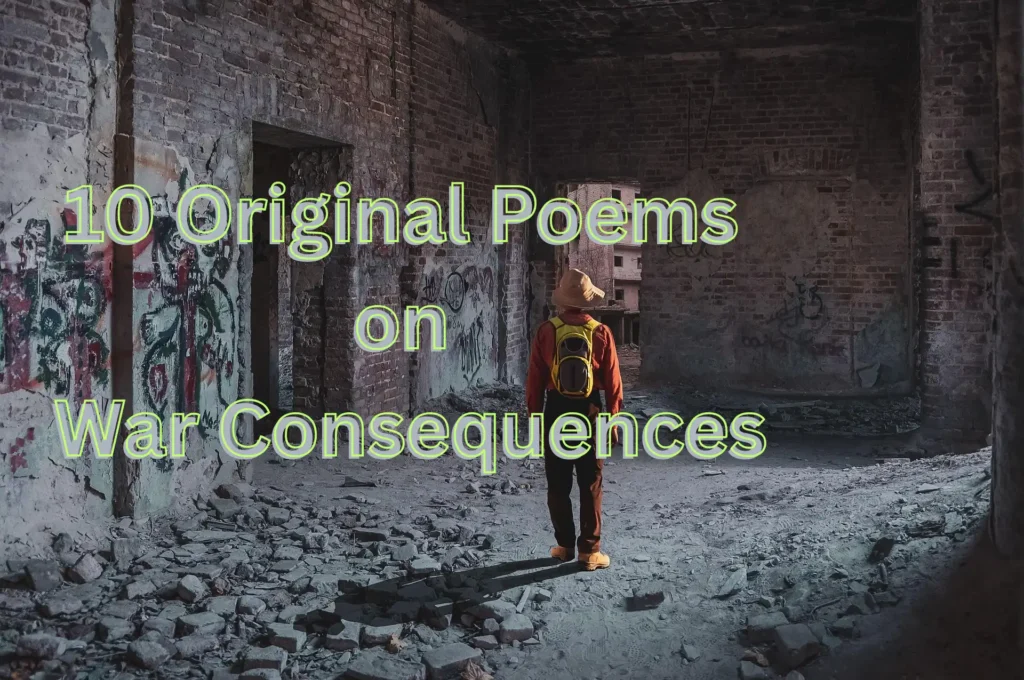The Raven Poem by Edgar Allan Poe. “The Raven” is one of Edgar Allan Poe’s most famous poems, first published in 1845. It is a dark and melancholic narrative poem that explores themes of grief, loss, and the haunting power of memory. The poem follows a grieving man who encounters a mysterious raven that repeatedly utters the word “Nevermore.” Through this eerie interaction, Poe creates an atmosphere of despair and psychological torment.
As the narrator descends into despair, the bird becomes a symbol of unending sorrow and the permanence of loss. With its dark gothic imagery, psychological depth, and exploration of themes like grief, madness, and the supernatural, The Raven remains a masterpiece of poetic storytelling, captivating readers for generations.
Explore: Poets and Poetry Page | Famous Quotes by Edgar Allan Poe | Edgar Allan Poe Biography | Poems by Edgar Allan Poe |
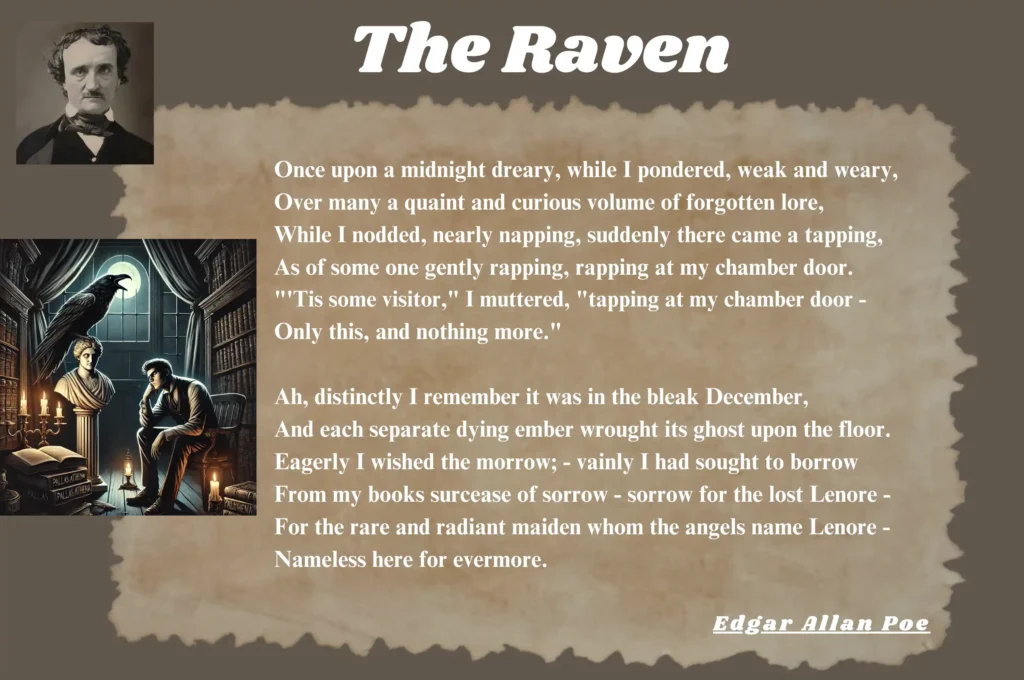
Table of Contents
The Raven Poem Lyrics
Once upon a midnight dreary, while I pondered, weak and weary,
~ The Raven Poem by Edgar Allan Poe
Over many a quaint and curious volume of forgotten lore,
While I nodded, nearly napping, suddenly there came a tapping,
As of some one gently rapping, rapping at my chamber door.
“‘Tis some visitor,” I muttered, “tapping at my chamber door –
Only this, and nothing more.”
Ah, distinctly I remember it was in the bleak December,
And each separate dying ember wrought its ghost upon the floor.
Eagerly I wished the morrow; – vainly I had sought to borrow
From my books surcease of sorrow – sorrow for the lost Lenore –
For the rare and radiant maiden whom the angels name Lenore –
Nameless here for evermore.
And the silken sad uncertain rustling of each purple curtain
Thrilled me – filled me with fantastic terrors never felt before;
So that now, to still the beating of my heart, I stood repeating,
“‘Tis some visitor entreating entrance at my chamber door –
Some late visitor entreating entrance at my chamber door; –
This it is, and nothing more.”
Presently my soul grew stronger; hesitating then no longer,
“Sir,” said I, “or Madam, truly your forgiveness I implore;
But the fact is I was napping, and so gently you came rapping,
And so faintly you came tapping, tapping at my chamber door,
That I scarce was sure I heard you”- here I opened wide the door; –
Darkness there, and nothing more.
Deep into that darkness peering, long I stood there wondering, fearing,
Doubting, dreaming dreams no mortals ever dared to dream before;
But the silence was unbroken, and the stillness gave no token,
And the only word there spoken was the whispered word, “Lenore?”
This I whispered, and an echo murmured back the word, “Lenore!” –
Merely this, and nothing more.
Back into the chamber turning, all my soul within me burning,
Soon again I heard a tapping somewhat louder than before.
“Surely,” said I, “surely that is something at my window lattice:
Let me see, then, what thereat is, and this mystery explore –
Let my heart be still a moment and this mystery explore; –
‘Tis the wind and nothing more.”
Open here I flung the shutter, when, with many a flirt and flutter,
In there stepped a stately raven of the saintly days of yore;
Not the least obeisance made he; not a minute stopped or stayed he;
But, with mien of lord or lady, perched above my chamber door –
Perched upon a bust of Pallas just above my chamber door –
Perched, and sat, and nothing more.
Then this ebony bird beguiling my sad fancy into smiling,
By the grave and stern decorum of the countenance it wore.
“Though thy crest be shorn and shaven, thou,” I said, “art sure no craven,
Ghastly grim and ancient raven wandering from the Nightly shore –
Tell me what thy lordly name is on the Night’s Plutonian shore!”
Quoth the Raven, “Nevermore.”
Much I marvelled this ungainly fowl to hear discourse so plainly,
Though its answer little meaning- little relevancy bore;
For we cannot help agreeing that no living human being
Ever yet was blest with seeing bird above his chamber door –
Bird or beast upon the sculptured bust above his chamber door,
With such name as “Nevermore.”
But the raven, sitting lonely on the placid bust, spoke only
That one word, as if his soul in that one word he did outpour.
Nothing further then he uttered- not a feather then he fluttered –
Till I scarcely more than muttered, “other friends have flown before –
On the morrow he will leave me, as my hopes have flown before.”
Then the bird said, “Nevermore.”
Startled at the stillness broken by reply so aptly spoken,
“Doubtless,” said I, “what it utters is its only stock and store,
Caught from some unhappy master whom unmerciful Disaster
Followed fast and followed faster till his songs one burden bore –
Till the dirges of his Hope that melancholy burden bore
Of ‘Never – nevermore’.”
But the Raven still beguiling all my fancy into smiling,
Straight I wheeled a cushioned seat in front of bird, and bust and door;
Then upon the velvet sinking, I betook myself to linking
Fancy unto fancy, thinking what this ominous bird of yore –
What this grim, ungainly, ghastly, gaunt and ominous bird of yore
Meant in croaking “Nevermore.”
This I sat engaged in guessing, but no syllable expressing
To the fowl whose fiery eyes now burned into my bosom’s core;
This and more I sat divining, with my head at ease reclining
On the cushion’s velvet lining that the lamplight gloated o’er,
But whose velvet violet lining with the lamplight gloating o’er,
She shall press, ah, nevermore!
Then methought the air grew denser, perfumed from an unseen censer
Swung by Seraphim whose footfalls tinkled on the tufted floor.
“Wretch,” I cried, “thy God hath lent thee – by these angels he hath sent thee
Respite – respite and nepenthe, from thy memories of Lenore:
Quaff, oh quaff this kind nepenthe and forget this lost Lenore!”
Quoth the Raven, “Nevermore.”
“Prophet!” said I, “thing of evil! – prophet still, if bird or devil! –
Whether Tempter sent, or whether tempest tossed thee here ashore,
Desolate yet all undaunted, on this desert land enchanted –
On this home by horror haunted- tell me truly, I implore –
Is there – is there balm in Gilead? – tell me – tell me, I implore!”
Quoth the Raven, “Nevermore.”
“Prophet!” said I, “thing of evil – prophet still, if bird or devil!
By that Heaven that bends above us – by that God we both adore –
Tell this soul with sorrow laden if, within the distant Aidenn,
It shall clasp a sainted maiden whom the angels name Lenore –
Clasp a rare and radiant maiden whom the angels name Lenore.”
Quoth the Raven, “Nevermore.”
“Be that word our sign in parting, bird or fiend,” I shrieked, upstarting –
“Get thee back into the tempest and the Night’s Plutonian shore!
Leave no black plume as a token of that lie thy soul hath spoken!
Leave my loneliness unbroken!- quit the bust above my door!
Take thy beak from out my heart, and take thy form from off my door!”
Quoth the Raven, “Nevermore.”
And the Raven, never flitting, still is sitting, still is sitting
On the pallid bust of Pallas just above my chamber door;
And his eyes have all the seeming of a demon’s that is dreaming,
And the lamplight o’er him streaming throws his shadow on the floor;
And my soul from out that shadow that lies floating on the floor
Shall be lifted – nevermore!
Explore: Poets and Poetry Page | Famous Quotes by Edgar Allan Poe | Edgar Allan Poe Biography | Poems by Edgar Allan Poe |
Line-by-Line Meaning and Analysis of The Raven Poem
Meaning and Analysis of The Raven Poem: Stanza 1
Once upon a midnight dreary, while I pondered, weak and weary,
~ The Raven Poem by Edgar Allan Poe
Over many a quaint and curious volume of forgotten lore,
While I nodded, nearly napping, suddenly there came a tapping,
As of some one gently rapping, rapping at my chamber door.
“‘Tis some visitor,” I muttered, “tapping at my chamber door –
Only this, and nothing more.”
The poem begins with a somber and eerie setting—midnight, a time often associated with mystery and the unknown. The narrator, weary and lost in thought, is reading old, obscure books in an attempt to distract himself, likely from sorrow or grief. As he struggles to stay awake, he suddenly hears a tapping at his chamber door, which startles him. At first, he dismisses it as nothing more than an ordinary visitor. However, this simple sound sets the stage for the growing tension and supernatural elements that follow, creating a sense of suspense and foreshadowing the haunting presence of the raven.
Meaning and Analysis of The Raven Poem: Stanza 2
Ah, distinctly I remember it was in the bleak December,
~ The Raven Poem by Edgar Allan Poe
And each separate dying ember wrought its ghost upon the floor.
Eagerly I wished the morrow; – vainly I had sought to borrow
From my books surcease of sorrow – sorrow for the lost Lenore –
For the rare and radiant maiden whom the angels name Lenore –
Nameless here for evermore.
The narrator vividly recalls that it is a cold and desolate December night, emphasizing the bleak and mournful atmosphere. The dying embers of the fire cast ghostly shadows on the floor, adding to the eerie mood. He longs for the morning, hoping for relief from his sorrow, but finds no comfort. His grief is centered around Lenore, a beloved woman who has passed away. Though she was once radiant and rare, she is now lost to him forever, and he cannot even bring himself to say her name aloud, heightening the sense of loss and despair.
Meaning and Analysis of The Raven Poem: Stanza 3
And the silken sad uncertain rustling of each purple curtain
~ The Raven Poem by Edgar Allan Poe
Thrilled me – filled me with fantastic terrors never felt before;
So that now, to still the beating of my heart, I stood repeating,
“‘Tis some visitor entreating entrance at my chamber door –
Some late visitor entreating entrance at my chamber door; –
This it is, and nothing more.”
The narrator becomes increasingly uneasy as the soft, uncertain rustling of his curtains fills him with an unfamiliar sense of fear. The eerie movement of the fabric adds to the suspense, making his imagination run wild with “fantastic terrors.” In an attempt to calm himself, he reassures his racing heart by rationalizing that it must be a late visitor knocking at his door. He clings to this logical explanation, trying to suppress his growing dread, but the ominous atmosphere suggests that something far more unsettling is at play.
Meaning and Analysis of The Raven Poem: Stanza 4
Presently my soul grew stronger; hesitating then no longer,
~ The Raven Poem by Edgar Allan Poe
“Sir,” said I, “or Madam, truly your forgiveness I implore;
But the fact is I was napping, and so gently you came rapping,
And so faintly you came tapping, tapping at my chamber door,
That I scarce was sure I heard you”- here I opened wide the door; –
Darkness there, and nothing more.
Summoning his courage, the narrator finally decides to confront the source of the mysterious tapping. With polite formality, he addresses the unknown visitor, apologizing for his delayed response, explaining that he had been napping and barely heard the sound. However, upon opening the door, he finds nothing but darkness. The emptiness beyond the threshold heightens the eerie and suspenseful mood, leaving the narrator bewildered and unsettled, as the presence he anticipated is nowhere to be seen.
Explore: Poets and Poetry Page | Famous Quotes by Edgar Allan Poe | Edgar Allan Poe Biography | Poems by Edgar Allan Poe |
Meaning and Analysis of The Raven Poem: Stanza 5
Deep into that darkness peering, long I stood there wondering, fearing,
~ The Raven Poem by Edgar Allan Poe
Doubting, dreaming dreams no mortals ever dared to dream before;
But the silence was unbroken, and the stillness gave no token,
And the only word there spoken was the whispered word, “Lenore?”
This I whispered, and an echo murmured back the word, “Lenore!” –
Merely this, and nothing more.
The speaker gazes deeply into the darkness beyond the open door, filled with a mix of fear, doubt, and wonder. His imagination conjures dreams beyond what any mortal has dared to dream. However, the silence remains unbroken, offering no signs or answers. In desperation, he softly whispers the name Lenore, hoping for a response. To his eerie surprise, the only reply is an echo of the name, reinforcing his loneliness and sorrow. The stanza deepens the poem’s gothic atmosphere, emphasizing the speaker’s longing and growing despair.
Meaning and Analysis of The Raven Poem: Stanza 6
Back into the chamber turning, all my soul within me burning,
~ The Raven Poem by Edgar Allan Poe
Soon again I heard a tapping somewhat louder than before.
“Surely,” said I, “surely that is something at my window lattice:
Let me see, then, what thereat is, and this mystery explore –
Let my heart be still a moment and this mystery explore; –
‘Tis the wind and nothing more.”
The speaker, now deeply unsettled, turns back into his chamber, his soul burning with unease. As he tries to regain his composure, he hears another tapping—this time louder—coming from the window. In an attempt to rationalize his fear, he convinces himself that it must be just the wind. However, his repeated insistence that it is “nothing more” hints at his internal conflict; he wants to believe in a logical explanation, but his growing anxiety suggests otherwise. This moment heightens the suspense, preparing for the dramatic entrance of the Raven.
Explore: Poets and Poetry Page | Famous Quotes by Edgar Allan Poe | Edgar Allan Poe Biography | Poems by Edgar Allan Poe |
Meaning and Analysis of The Raven Poem: Stanza 7
Open here I flung the shutter, when, with many a flirt and flutter,
~ The Raven Poem by Edgar Allan Poe
In there stepped a stately raven of the saintly days of yore;
Not the least obeisance made he; not a minute stopped or stayed he;
But, with mien of lord or lady, perched above my chamber door –
Perched upon a bust of Pallas just above my chamber door –
Perched, and sat, and nothing more.
As the speaker boldly opens the shutter, a raven unexpectedly enters, flapping its wings with elegance. The bird, described as regal and ancient, carries an air of mystery. It does not show any sign of acknowledgment or hesitation but confidently perches itself on a bust of Pallas (the Greek goddess of wisdom) above the chamber door. This moment introduces the raven as a symbolic figure—possibly representing wisdom, fate, or an ominous message. The repetition of “Perched, and sat, and nothing more” builds suspense, leaving the speaker (and the reader) eager to understand its purpose.
Meaning and Analysis of The Raven Poem: Stanza 8
Then this ebony bird beguiling my sad fancy into smiling,
~ The Raven Poem by Edgar Allan Poe
By the grave and stern decorum of the countenance it wore.
“Though thy crest be shorn and shaven, thou,” I said, “art sure no craven,
Ghastly grim and ancient raven wandering from the Nightly shore –
Tell me what thy lordly name is on the Night’s Plutonian shore!”
Quoth the Raven, “Nevermore.”
The speaker is momentarily amused by the raven’s serious and dignified expression, despite his sorrow. He addresses the bird, noting its eerie and ancient appearance, and suggests it must have come from the “Night’s Plutonian shore”—a reference to the underworld ruled by Pluto (Hades in Greek mythology). The speaker asks for the raven’s name, and in a chilling response, the bird utters its now-famous word: “Nevermore.” This moment marks a turning point in the poem, as the raven’s presence shifts from being merely unusual to something deeply unsettling, possibly supernatural.
Meaning and Analysis of The Raven Poem: Stanza 9
Much I marvelled this ungainly fowl to hear discourse so plainly,
~ The Raven Poem by Edgar Allan Poe
Though its answer little meaning- little relevancy bore;
For we cannot help agreeing that no living human being
Ever yet was blest with seeing bird above his chamber door –
Bird or beast upon the sculptured bust above his chamber door,
With such name as “Nevermore.”
The speaker is astonished that the raven can speak so clearly, though he believes its response carries little meaning or relevance. He acknowledges the sheer oddity of the situation—no one has ever seen a bird or any creature perched above their door, speaking a name as peculiar as “Nevermore.” This stanza highlights the eerie and surreal nature of the moment, reinforcing the poem’s themes of the unknown, the supernatural, and the unsettling presence of fate or doom.
Meaning and Analysis of The Raven Poem: Stanza 10
But the raven, sitting lonely on the placid bust, spoke only
~ The Raven Poem by Edgar Allan Poe
That one word, as if his soul in that one word he did outpour.
Nothing further then he uttered- not a feather then he fluttered –
Till I scarcely more than muttered, “other friends have flown before –
On the morrow he will leave me, as my hopes have flown before.”
Then the bird said, “Nevermore.”
The raven remains perched on the bust, motionless and silent, except for the single word “Nevermore.” The speaker begins to rationalize the bird’s presence, believing it will leave him like others have before—just as his hopes and happiness have faded. However, when he voices this thought, the raven responds again with “Nevermore,” deepening the speaker’s despair. This moment intensifies the poem’s themes of loss and inevitability, as the bird appears to be an omen reinforcing the permanence of sorrow.
Explore: Poets and Poetry Page | Famous Quotes by Edgar Allan Poe | Edgar Allan Poe Biography | Poems by Edgar Allan Poe |
Meaning and Analysis of The Raven Poem: Stanza 11
Startled at the stillness broken by reply so aptly spoken,
~ The Raven Poem by Edgar Allan Poe
“Doubtless,” said I, “what it utters is its only stock and store,
Caught from some unhappy master whom unmerciful Disaster
Followed fast and followed faster till his songs one burden bore –
Till the dirges of his Hope that melancholy burden bore
Of ‘Never – nevermore’.”
The speaker is startled by the raven’s response, but he attempts to rationalize it. He assumes that the bird has merely learned this word from a previous owner—someone who suffered great misfortunes and repeated the phrase “Nevermore” in despair. This interpretation momentarily gives the speaker comfort, as he attributes the bird’s speech to past human tragedy rather than a supernatural message. However, this reasoning also reinforces the poem’s melancholic tone, suggesting that suffering and loss are inescapable cycles.
Meaning and Analysis of The Raven Poem: Stanza 12
But the Raven still beguiling all my fancy into smiling,
~ The Raven Poem by Edgar Allan Poe
Straight I wheeled a cushioned seat in front of bird, and bust and door;
Then upon the velvet sinking, I betook myself to linking
Fancy unto fancy, thinking what this ominous bird of yore –
What this grim, ungainly, ghastly, gaunt and ominous bird of yore
Meant in croaking “Nevermore.”
Despite the eerie nature of the raven’s presence, the speaker finds himself strangely amused and intrigued by the bird. He pulls up a chair and sits in deep contemplation, attempting to decipher the meaning behind the raven’s repeated utterance of “Nevermore.” The choice of words like “ominous” and “ghastly” suggests that the speaker senses an unsettling significance in the bird’s arrival, hinting at a growing realization that the raven’s message may be more than just coincidence. This stanza marks a turning point, as curiosity begins to give way to deeper existential questioning.
Meaning and Analysis of The Raven Poem: Stanza 13
This I sat engaged in guessing, but no syllable expressing
~ The Raven Poem by Edgar Allan Poe
To the fowl whose fiery eyes now burned into my bosom’s core;
This and more I sat divining, with my head at ease reclining
On the cushion’s velvet lining that the lamplight gloated o’er,
But whose velvet violet lining with the lamplight gloating o’er,
She shall press, ah, nevermore!
The speaker, now deeply engrossed in thought, tries to decipher the meaning behind the raven’s presence and its cryptic refrain, “Nevermore.” The bird’s fiery gaze seems to pierce his soul, intensifying his sorrow and despair. As he leans back on a velvet cushion, he is reminded of his lost love, Lenore. The realization that she will never rest upon that cushion again fills him with profound grief. The repetition of “nevermore” reinforces the permanence of his loss, making the stanza a reflection of his growing descent into sorrow and hopelessness.
Explore: Poets and Poetry Page | Famous Quotes by Edgar Allan Poe | Edgar Allan Poe Biography | Poems by Edgar Allan Poe |
Meaning and Analysis of The Raven Poem: Stanza 14
Then methought the air grew denser, perfumed from an unseen censer
~ The Raven Poem by Edgar Allan Poe
Swung by Seraphim whose footfalls tinkled on the tufted floor.
“Wretch,” I cried, “thy God hath lent thee – by these angels he hath sent thee
Respite – respite and nepenthe, from thy memories of Lenore:
Quaff, oh quaff this kind nepenthe and forget this lost Lenore!”
Quoth the Raven, “Nevermore.”
The atmosphere in the room grows heavier, as if filled with an invisible, mystical perfume, suggesting a supernatural presence. The speaker imagines angels (Seraphim) swinging a censer, filling the air with a soothing scent. He desperately believes that God has sent this as a gift—a chance for relief (respite) from his sorrow through nepenthe, a mythical potion that erases grief. In his desperation, he pleads to drink deeply and forget Lenore. However, the raven, acting as a symbol of fate or doom, shatters this hope with its haunting response—“Nevermore”—confirming that he will never escape his pain.
Meaning and Analysis of The Raven Poem: Stanza 15
“Prophet!” said I, “thing of evil! – prophet still, if bird or devil! –
~ The Raven Poem by Edgar Allan Poe
Whether Tempter sent, or whether tempest tossed thee here ashore,
Desolate yet all undaunted, on this desert land enchanted –
On this home by horror haunted- tell me truly, I implore –
Is there – is there balm in Gilead? – tell me – tell me, I implore!”
Quoth the Raven, “Nevermore.”
The speaker, now consumed by fear and despair, directly addresses the raven as a prophet—whether divine or demonic. He questions whether the bird was sent by the Tempter (Satan) or whether it arrived by chance, blown in by a storm. Despite his loneliness and suffering, he still seeks hope. He asks if there is balm in Gilead—a biblical reference to a healing ointment, symbolizing relief from pain and sorrow. The question is a desperate plea for comfort, asking if he will ever find peace from his grief. The raven, relentless in its grim message, again responds with “Nevermore,” crushing any hope of healing.
Meaning and Analysis of The Raven Poem: Stanza 16
“Prophet!” said I, “thing of evil – prophet still, if bird or devil!
~ The Raven Poem by Edgar Allan Poe
By that Heaven that bends above us – by that God we both adore –
Tell this soul with sorrow laden if, within the distant Aidenn,
It shall clasp a sainted maiden whom the angels name Lenore –
Clasp a rare and radiant maiden whom the angels name Lenore.”
Quoth the Raven, “Nevermore.”
The speaker, now overwhelmed with anguish, pleads with the raven for a final answer. He invokes Heaven and God, asking whether he will be reunited with his lost love, Lenore, in the afterlife (Aidenn—a reference to Eden or paradise). His desperate hope is that he will once again clasp her, embracing her in a world beyond death. However, the raven delivers its most devastating reply yet: “Nevermore.” This response shatters the speaker’s last hope, confirming that he will never see Lenore again, neither in life nor in the afterlife. The finality of this pronouncement drives him deeper into despair.
Explore: Poets and Poetry Page | Famous Quotes by Edgar Allan Poe | Edgar Allan Poe Biography | Poems by Edgar Allan Poe |
Meaning and Analysis of The Raven Poem: Stanza 17
“Be that word our sign in parting, bird or fiend,” I shrieked, upstarting –
~ The Raven Poem by Edgar Allan Poe
“Get thee back into the tempest and the Night’s Plutonian shore!
Leave no black plume as a token of that lie thy soul hath spoken!
Leave my loneliness unbroken!- quit the bust above my door!
Take thy beak from out my heart, and take thy form from off my door!”
Quoth the Raven, “Nevermore.”
In a final outburst of despair and rage, the speaker demands that the raven leave. Calling it a “bird or fiend,” he commands it to return to the “Night’s Plutonian shore,” a reference to the dark underworld of Pluto, the Roman god of death. He insists that it take its “black plume” and its “lie” with it, no longer wishing to hear its haunting word. The imagery of “take thy beak from out my heart” symbolizes the deep emotional wound inflicted by the raven’s relentless “Nevermore.” Yet, the bird remains unmoved, repeating the same chilling refrain. This final “Nevermore” seals the speaker’s fate—he is forever trapped in his grief and hopelessness.
Meaning and Analysis of The Raven Poem: Stanza 18
And the Raven, never flitting, still is sitting, still is sitting
~ The Raven Poem by Edgar Allan Poe
On the pallid bust of Pallas just above my chamber door;
And his eyes have all the seeming of a demon’s that is dreaming,
And the lamplight o’er him streaming throws his shadow on the floor;
And my soul from out that shadow that lies floating on the floor
Shall be lifted – nevermore!
The poem concludes with an image of despair and eternal sorrow. The raven remains motionless, still perched on the “pallid bust of Pallas” above the speaker’s chamber door, symbolizing that wisdom (Pallas Athena) has been overshadowed by grief and hopelessness. The bird’s eyes are likened to a “demon’s that is dreaming,” suggesting a supernatural presence that torments the speaker. The lamplight casts the raven’s shadow onto the floor, and the speaker realizes that his soul will never escape from under this shadow—his grief is inescapable. The final line, “Shall be lifted—nevermore!” confirms his descent into eternal sorrow, with no hope of redemption or peace.
Theme of the Poem
- Grief and Loss – The poem explores the agony of losing a loved one and the inability to move on.
- Madness and Obsession – The speaker’s descent into madness is fueled by his desperate search for meaning in the raven’s words.
- The Supernatural and Fate – The raven’s presence suggests an eerie, supernatural force at play, possibly representing fate or an inescapable destiny.
- Hopelessness and Despair – The repeated refrain “Nevermore” reinforces the idea that some losses are permanent and that there is no relief from suffering.
Summary of the Poem
“The Raven” tells the story of a grieving man who is visited by a mysterious raven that only speaks one word: “Nevermore.” As the speaker questions the bird, he realizes that it symbolizes his eternal sorrow and inability to escape the pain of losing Lenore. The poem concludes with the speaker succumbing to despair, believing he is doomed to live in mourning forever.
Explore: Poets and Poetry Page | Famous Quotes by Edgar Allan Poe | Edgar Allan Poe Biography | Poems by Edgar Allan Poe |
List of Poets in Alphabetical Order
कवियों की सूची
Explore our Literature YouTube Channels:

YouTube Channel Link:

YouTube Channel Link:

YouTube Channel Link:
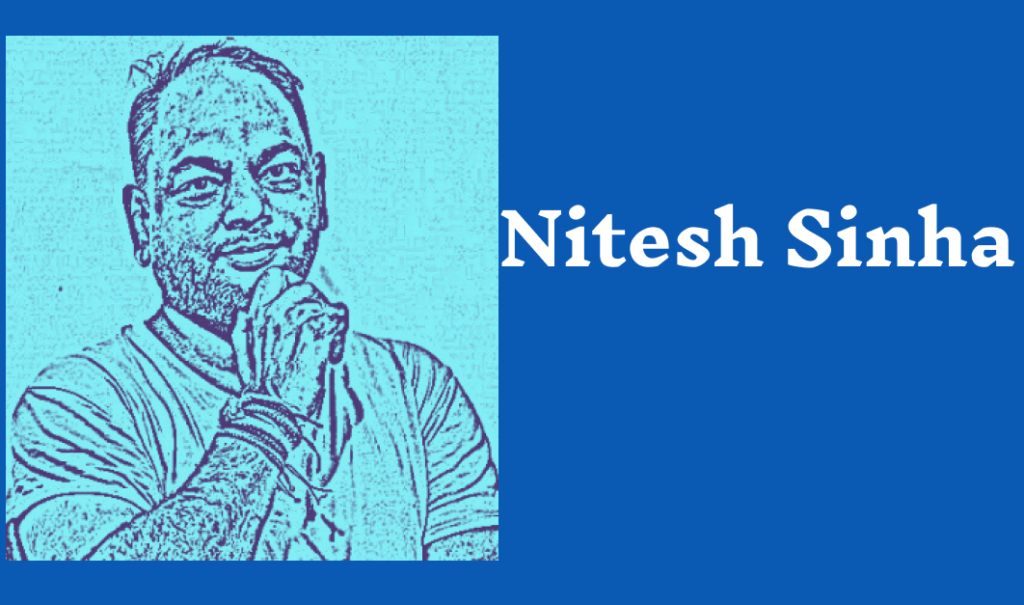
YouTube Channel Link

